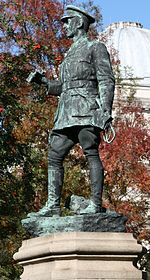Lord Ninian Crichton-Stuart, Date of Birth, Place of Birth, Date of Death
TweetLord Ninian Crichton-Stuart
British politician
 Date of Birth: 15-May-1883
Date of Birth: 15-May-1883
 Place of Birth: Ayrshire, Scotland, United Kingdom
Place of Birth: Ayrshire, Scotland, United Kingdom
Date of Death: 02-Oct-1915
Profession: politician
Zodiac Sign: Taurus 
About Lord Ninian Crichton-Stuart
- Lieutenant-Colonel Lord Ninian Edward Crichton-Stuart (15 May 1883 – 2 October 1915) was a Scottish senior officer in the British Army and Member of Parliament.
- He was killed in action in the First World War.
- The second son of the Honourable Gwendolen Mary Anne Fitzalan-Howard and John Crichton-Stuart, 3rd Marquess of Bute, he entered the army in 1903 and served in the Queen's Own Cameron Highlanders and the Scots Guards as a lieutenant.
- After marrying he began a career in politics, serving first as a councillor on Fife County Council, Scotland.
- His family having close connections to the city of Cardiff in Wales, he fought and lost the January 1910 election there as a Liberal Unionist candidate.
- The resulting hung parliament led to a second election in December 1910, in which Crichton-Stuart won the seat. In 1912, he took command of the 6th battalion, the Welch Regiment.
- Upon the outbreak of the First World War, he volunteered his unit for service and joined the British Expeditionary Force on the Western Front.
- After eleven months on the frontline, he was shot in the head and killed when leading his men in an attempt to repel a German counter-attack on 2 October 1915 during the Battle of Loos.
- He was one of 22 MPs that were killed during the conflict and the only serving MP from Wales to be killed. The home ground of Cardiff City F.C.
- was named Ninian Park after Crichton-Stuart offered to be a guarantor for the football club's rental of the site.
- After his death, a statue of Crichton-Stuart was erected in Cathays Park in Cardiff.
Read more at Wikipedia

